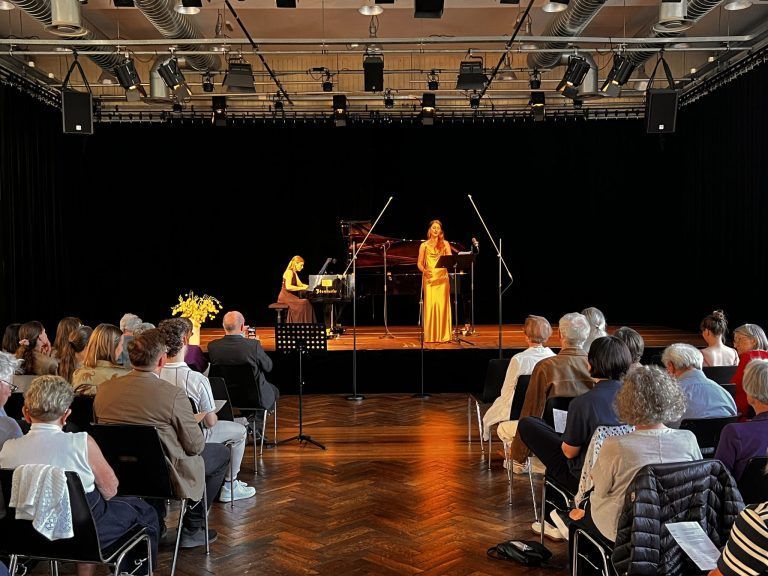Concert Review by Andreas Marte in the Vorarlberger Nachrichten, June 11th 2025.
Corinna Scheurle and Hanna Bachmann captivated with a romantic song recital.
It was an evening the Chopin Society could hardly have wished for more beautifully – one of those rare moments in which artistic maturity, mutual familiarity, and deeply felt musicianship converge in such a quiet way that listeners are drawn almost imperceptibly into the inner landscapes of Romanticism. Mezzo-soprano Corinna Scheurle and pianist Hanna Bachmann, both raised in Vorarlberg and now at home on international stages, presented a program on Monday at Feldkirch’s nearly sold-out Pförtnerhaus that impressed with its dramaturgical arc and, above all, the high art of sensitive song interpretation.
Attuned interplay
From the very first bars it was clear: here were two artists who not only understand each other musically but also support one another expressively, inspiring each other and shaping their shared breathing with fine attentiveness. In Schubert’s Der Musensohn (Johann Wolfgang von Goethe), this was not merely a cheerful opening but also a discreet indication of the evening’s poetic self-conception: music as a wandering, searching, questioning movement through inner spaces.
The art of song with depth
Corinna Scheurle impressed with a warmly grounded mezzo-soprano cultivated across all registers, never aimed at mere effect but always in service of the word and its subtle meaning. Her voice blossomed in Hugo Wolf’s An eine Äolsharfe as much as in the floating Verborgenheit (both texts by Eduard Mörike), which she shaped with tender intimacy and touching transparency. Her ability to move between poetic declamation and lyrical cantabile made each song a miniature dramatic monologue: nuanced, radiant, and never mannered. Hanna Bachmann was not only a reliable but also an artistically highly present partner at the piano.
Her playing was marked by subtle flexibility of tempo, breathing phrasing, and a striking range of colours —whether in the shimmering water figures of Auf dem Wasser zu singen (Friedrich Leopold zu Stolberg-Stolberg) or in the threatening unrest of Erlkönig (Goethe), which she played with rhythmic precision and inner urgency. In the more intimate moments, such as Nacht und Träume, she let the piano almost float, as if accompanying the breath of the dream itself.
The thoughtful selection of the repertoire — from the lyrical early Romanticism of Schubert to the dense, expressive language of Hugo Wolf — offered not only a fascinating contrast between the two composers but also revealed the psychological dimension they share: wandering, yearning, silence in the night, the tentative search for a home within oneself and in the other. All of this became palpable in their interpretation.
A dialogue in music
And yet, for all its seriousness, the evening remained light — thanks to the performers’ heartfelt joy in music-making, their unaffected presence, and the naturalness with which they approached the great themes of Romanticism.
It was as if one were listening to a conversation. An evening to be remembered — and one that quietly reminded us of the power and beauty inherent in the concentrated form of the art song, when shaped as it was here: with heart, intellect, and a fine sense for the shared, breathing moment. The audience released the two musicians only after two encores and long applause.
